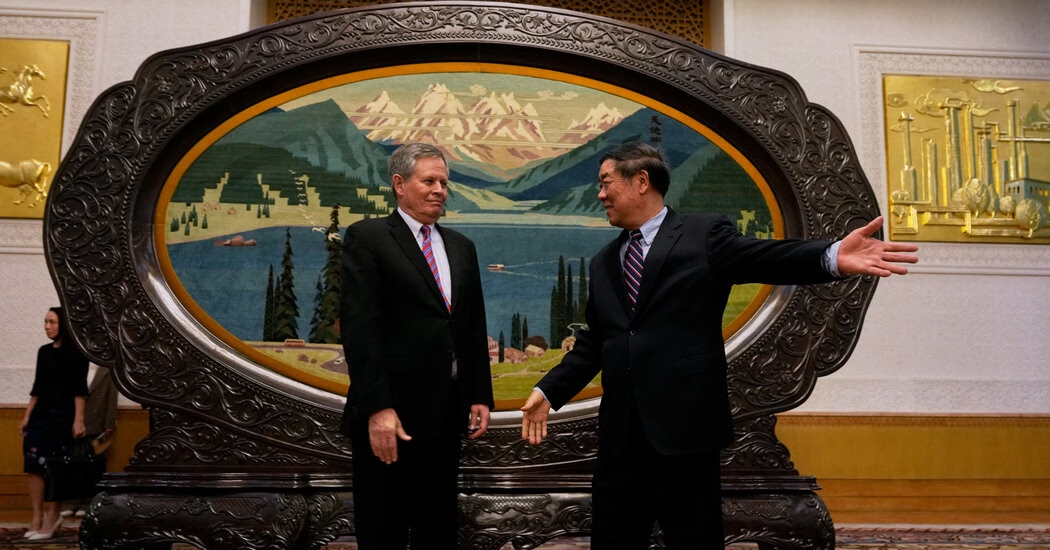Since the beginning of President Trump’s second term in January, there have been no high-level meetings between officials from the United States and China, despite the two countries imposing steep tariffs on each other.
In the absence of official meetings, Senator Steve Daines of Montana has taken on the role of a mediator. Mr. Daines met with Vice Premier He Lifeng, who handles many economic issues for China, on Saturday and was scheduled to meet Premier Li Qiang, China’s second-highest official, on Sunday.
In an interview with The New York Times on Saturday after the meeting with Mr. He, Mr. Daines, a Republican member of the Senate Foreign Relations Committee, emphasized the importance of China taking action to prevent the export of chemical precursors for fentanyl.
“I met with President Trump a few days before I came over,” Mr. Daines said. “He was pleased that I was coming to communicate his ‘America First’ message and, importantly, to make sure that Chinese leaders knew the seriousness of the fentanyl issue, and the role that China can play in stopping the shipment of precursors to the Mexican cartels.”
Chinese officials have claimed that the fentanyl crisis is rooted in America’s inability to curb demand for the drug and have insisted that Beijing has taken measures to limit shipments of fentanyl and its chemical precursors. The Chinese cabinet released a report earlier this month on its efforts in this regard, which is being studied by American officials.
Mr. Daines stated that he is aiming to facilitate a meeting between President Trump and Xi Jinping, China’s top leader. “This visit is the first step to arrange and set up the next step, which will be a very important meeting between President Xi and President Trump — when that occurs, I don’t know, where it occurs, I don’t know.”
Although the White House has not officially named Mr. Daines to represent them, he is considered one of Mr. Trump’s top allies in Congress. Mr. Daines was the first Republican senator to endorse Mr. Trump for a second term in 2023 when many others were hesitant.
According to Wu Xinbo, dean of the Institute of International Studies at Fudan University in Shanghai, China is interested in learning about Mr. Trump’s China policy intentions through Senator Daines, particularly regarding trade deals and how they would be structured.
China also wants Senator Daines to convey a message to Mr. Trump that China is willing to engage in dialogue and hopes to avoid an escalation of tensions.
Mr. Trump has imposed high tariffs on Chinese goods and threatened further measures. China seeks to prevent additional tariffs.
“There is a window of opportunity before early April for China and the United States to engage with each other. Senator Daines’s visit could play a pivotal role,” Mr. Wu said.
Mr. Daines mentioned that he is not focusing on tariffs with China, as the Office of the United States Trade Representative has not yet completed its policy review.
Mr. Trump intends to meet with Mr. Xi but has not provided any specific details. China has been silent regarding the matter. However, there have been no working-level administrative contacts between the two countries during Mr. Trump’s second term, which are typically a precursor to such meetings.
Mr. Xi is responsible for all key decisions in China, particularly regarding foreign policy. Consequently, summits with American presidents are crucial in determining the trajectory of bilateral relations. The two leaders met in 2017 when Mr. Xi visited Mar-a-Lago, Florida, and Mr. Trump visited China.
The lack of engagement with Washington has led some in Beijing to question whether Mr. Trump genuinely desires a meeting with Mr. Xi, according to Yun Sun, the director of the China program at the Stimson Center in Washington.
“The Chinese see Mr. Trump’s position changing rapidly on numerous issues,” Ms. Sun said. “This translates to a sense of fatalism among the Chinese, that they should prepare for the worst-case scenario, which is their conclusion.”
During his visit to Beijing, Mr. Daines also expressed concern about China’s barriers to imports, beyond tariffs. He declined to provide specifics. However, it is known that politicians from Montana have long argued against China’s occasional bans on importing beef from the state, claiming they were unfair trade barriers unrelated to concerns about mad cow disease.
From the 1990s to the present day, Mr. Daines has made six trips to China since his election to the Senate in 2014, making him one of the few members of Congress to continue traveling to the country despite deteriorating relations.
Source: https://www.nytimes.com/2025/03/22/world/asia/trump-china-xi-daines.html



